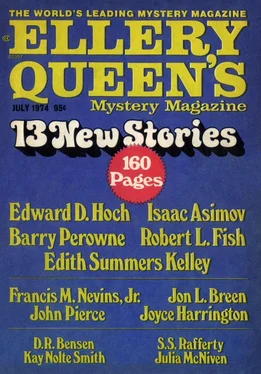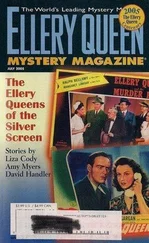Isaac Asimov - Ellery Queen’s Mystery Magazine, Vol. 64, No. 1. Whole No. 368, July 1974
Здесь есть возможность читать онлайн «Isaac Asimov - Ellery Queen’s Mystery Magazine, Vol. 64, No. 1. Whole No. 368, July 1974» весь текст электронной книги совершенно бесплатно (целиком полную версию без сокращений). В некоторых случаях можно слушать аудио, скачать через торрент в формате fb2 и присутствует краткое содержание. Город: New York, Год выпуска: 1974, Издательство: Davis Publications, Жанр: Классический детектив, на английском языке. Описание произведения, (предисловие) а так же отзывы посетителей доступны на портале библиотеки ЛибКат.
- Название:Ellery Queen’s Mystery Magazine, Vol. 64, No. 1. Whole No. 368, July 1974
- Автор:
- Издательство:Davis Publications
- Жанр:
- Год:1974
- Город:New York
- ISBN:нет данных
- Рейтинг книги:5 / 5. Голосов: 1
-
Избранное:Добавить в избранное
- Отзывы:
-
Ваша оценка:
- 100
- 1
- 2
- 3
- 4
- 5
Ellery Queen’s Mystery Magazine, Vol. 64, No. 1. Whole No. 368, July 1974: краткое содержание, описание и аннотация
Предлагаем к чтению аннотацию, описание, краткое содержание или предисловие (зависит от того, что написал сам автор книги «Ellery Queen’s Mystery Magazine, Vol. 64, No. 1. Whole No. 368, July 1974»). Если вы не нашли необходимую информацию о книге — напишите в комментариях, мы постараемся отыскать её.
Ellery Queen’s Mystery Magazine, Vol. 64, No. 1. Whole No. 368, July 1974 — читать онлайн бесплатно полную книгу (весь текст) целиком
Ниже представлен текст книги, разбитый по страницам. Система сохранения места последней прочитанной страницы, позволяет с удобством читать онлайн бесплатно книгу «Ellery Queen’s Mystery Magazine, Vol. 64, No. 1. Whole No. 368, July 1974», без необходимости каждый раз заново искать на чём Вы остановились. Поставьте закладку, и сможете в любой момент перейти на страницу, на которой закончили чтение.
Интервал:
Закладка:
Ellery Queen’s Mystery Magazine, Vol. 64, No. 1. Whole No. 368, July 1974

A Chip of the Black Stone
by Isaac Asimov [1] ©1974 by Isaac Asimov.
Another vivid account of a monthly meeting of the Black Widowers Club... The honored guest this evening is a jeweler named Latimer Reed, and we are assured by the host, Geoffrey Avalon the patent attorney, that there will be no crime to solve, no mystery to unravel — but don’t you believe it! We guarantee you will be fascinated by the romantic story that unfolds...
Geoffrey Avalon, the patent attorney, stirred his drink and smiled wolfishly. His hairy still-dark eyebrows slanted upward and his neat graying beard seemed to twitch. He looked like Satan in an amiable mood.
He said to the Black Widowers, assembled at their monthly club dinner, “Let me present my guest — Latimer Reed, jeweler. And let me say at once that he brings us no crime to solve, no mystery to unravel. Nothing has been stolen from him; he has witnessed no murder, has involved himself in no spy ring. He is here, purely and simply, to tell us about jewelry, to answer our questions, and to help us have a good sociable evening.”
And, indeed, under Avalon’s firm eye the atmosphere at dinner was quiet and relaxed and even writer Emmanuel Rubin, the ever-quarrelsome polymath of the club, managed to avoid raising his voice. Quite satisfied, Avalon said, over the brandy, “Gentlemen, the postprandial grilling is upon us, and with no problem over which to rack our brains. — Henry, you may relax.”
Henry, who was clearing the table with the usual quiet efficiency that would have made him the nonpareil of waiters even if he had not proved himself, over and over again, to be peerlessly aware of the obvious, said, “Thank you, Mr. Avalon. I trust I will not be excluded from the proceedings, however.”
Rubin fixed Henry with an owlish stare through his thick glasses and said loudly, “Henry, this blatantly false modesty does not become you. You know you’re a member of our little band, with all the privileges appertaining thereto.”
“If that is so,” said Roger Halsted, the soft-voiced mathematics teacher, sipping his brandy and openly inviting a quarrel, “why is he waiting on table?”
“Personal choice, sir,” said Henry quickly and Rubin’s opening mouth shut again.
Avalon said, “Let’s get on with it. Tom Trumbull isn’t with us, so, as host, I appoint you, Mario, as griller-in-chief.”
Mario Gonzalo, a not-incon-siderable artist, was placing the final touches on the caricature he was drawing of Reed, one that was intended to be added to the already long line that decorated the private room of the Fifth Avenue restaurant at which the dinners of the Black Widowers were held.
Gonzalo had, perhaps, overdrawn, the bald dome of Reed’s head and the solemn length of his bare upper lip, and made over-apparent the slight tendency to jowls. There was indeed something more than a trace of the bloodhound about the caricature, but Reed smiled when he saw the result and did not seem offended.
Gonzalo smoothed the perfect Windsor knot of his pink-and-white tie and let his blue jacket fall open with careful negligence as he leaned back and said, “How do you justify your existence, Mr. Reed?”
“Sir?” said Reed, in a slightly metallic voice.
Gonzalo said, without varying pitch or stress, “How do you justify your existence, Mr. Reed?”
Reed looked around the table at the five grave faces and smiled — a smile that did not, somehow, seriously diminish the essential sadness of his own expression.
“Jeff warned me,” he said, “that I would be questioned after the dinner, but he did not tell me I would be challenged to justify myself.”
“Always best,” said Avalon sententiously, “to catch a man by surprise.”
Reed said, “What can serve to justify any of us? But if I must say something, I would say that I help bring beauty into lives.”
“What kind of beauty?” asked Gonzalo. “Artistic beauty?” And he held up the caricature.
Reed laughed. “Less controversial forms of beauty, I should hope.” He pulled a handkerchief out of his inner jacket pocket and, carefully unfolding it on the table, exposed about a dozen gleaming, deeply colored bits of mineral.
“All men agree on the beauty of gems,” he said. “That is independent of subjective taste.” He held up a small deep-red stone and the lights glanced off it.
James Drake, the organic chemist, cleared his throat and said with his usual mild hoarseness, “Do you always carry those things around with you?”
“No, of course not,” said Reed. “Only when I wish to entertain or demonstrate.”
“In a handkerchief?” said Drake.
Rubin burst in at once. “Sure, what’s the difference? If he’s held up, keeping if in a locked box won’t do him any good. He’d just be out the price of a box as well.”
“Have you ever been held up?” asked Gonzalo.
“No,” said Reed. “My best defense is that I am known never to carry much of value with me. I strive to make that as widely known as possible, and to live up to it, too.”
“That doesn’t look it,” said Drake.
“I am demonstrating beauty, not value,” said Reed. “Would you care to pass these around among yourselves, gentlemen?”
There was no immediate move and then Drake said, “Henry, would you be in a position to lock the door?”
“Certainly, sir,” said Henry, and did so.
Reed looked surprised. “Why lock the door?”
Drake cleared his throat again and stubbed out the remnant of his cigarette with a stained thumb and forefinger. “I’m afraid that with the kind of record we now have at our monthly dinners those things will be passed around and inevitably one of them will disappear.”
“That’s a tasteless remark, Jim,” said Avalon, frowning.
Reed said, “Gentlemen, there is no need to worry. These stones may all disappear with little loss to me or gain to anyone else. I said I was demonstrating beauty, not value. This one I am holding is a ruby — quite so — but synthetic. There are a few other synthetics and here we have an irreparably cracked opal. Others are riddled with flaws. These will do no one any good and I’m sure Henry can unlock the door.”
Halsted said, stuttering very slightly in controlled excitement, “No, I’m with Jim. Something is just fated to come up. I’ll bet that Mr. Reed has included one very valuable item — quite by accident, perhaps — and that one will turn up missing. I just don’t believe we can go through an evening without some puzzle facing us.”
Reed said, “I know every one of these stones and if you like I’ll look at each one again.” He did so, then pushed them out into the center of the table. “Merely trinkets that serve to satisfy the innate craving of human beings for beauty.”
Rubin grumbled, “Which, however, only the rich can afford.”
“Quite wrong, Mr. Rubin. Quite wrong. These stones are not terribly expensive. And even jewelry that is costly is often on display for all eyes — and even the owner can do no more than look at what he owns, though more frequently than others. Primitive tribes might make ornaments as satisfying to themselves as jewelry is to us out of shark’s teeth, walrus tusks, seashells, or birchbark. Beauty is independent of material, or of fixed rules of esthetics, and in my way I am its servant.”
Читать дальшеИнтервал:
Закладка:
Похожие книги на «Ellery Queen’s Mystery Magazine, Vol. 64, No. 1. Whole No. 368, July 1974»
Представляем Вашему вниманию похожие книги на «Ellery Queen’s Mystery Magazine, Vol. 64, No. 1. Whole No. 368, July 1974» списком для выбора. Мы отобрали схожую по названию и смыслу литературу в надежде предоставить читателям больше вариантов отыскать новые, интересные, ещё непрочитанные произведения.
Обсуждение, отзывы о книге «Ellery Queen’s Mystery Magazine, Vol. 64, No. 1. Whole No. 368, July 1974» и просто собственные мнения читателей. Оставьте ваши комментарии, напишите, что Вы думаете о произведении, его смысле или главных героях. Укажите что конкретно понравилось, а что нет, и почему Вы так считаете.












